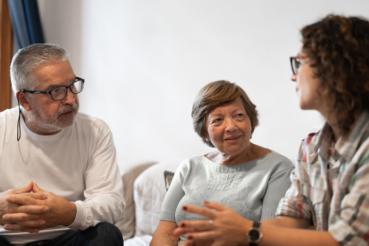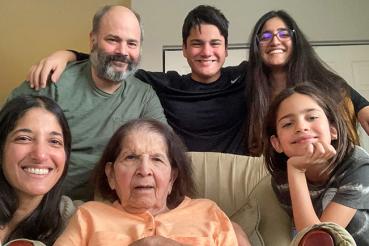Being diagnosed with dementia can be devastating, not only for the person who receives the diagnosis, but also for their close friends and family members. Receiving this news can take a toll on everyone in the family and leave them with many unanswered questions about the future, including how to manage care.
The recent news from the Carter family about former first lady Rosalynn Carter receiving a dementia diagnosis shines a light on the importance of caregiving, an area of focus for her throughout her life. In 1987, she established the Rosalynn Carter Institute for Caregivers, and Rush received the Rosalynn Carter Leadership in Caregiving Award in 2011.
Dementia is a diagnosis so common that everyone may deal with at some point in their life, either directly or indirectly. With this type of diagnosis, many questions arise for patients and their loved ones, such as how to find and access clinical care and support services and how to navigate through the stigma surrounding mental health that can delay or interfere with getting care.
Resources here in the U.S. and around the world for caregivers, but RUSH is positioned to help change that. The Caring for Caregivers program, developed at RUSH with funding from the RRF Foundation for Aging, is being shared as a model for other hospitals to adopt. The John A. Hartford Foundation awarded RUSH a $1.9 million grant in 2022 to help other hospitals adopt the Caring for Caregivers model. In partnership with the Institute for Healthcare Improvement, the model program to support family caregivers of older adults is being shared with Age-Friendly Health Systems and Area Agencies on Aging nationwide.
“These partnerships are critical now especially, as members of our society age and the need for caregivers increase,” said Robyn Golden, LCSW, chair of the Department of Social Work, associate vice president of Social Work and Community Health, and co-director of the Center for Excellence in Aging and the Center for Health and Social Care Integration at RUSH. “Often caregivers are placed in these positions without being asked if they are ready, willing or able to provide this kind of care.”
The Caring for Caregivers model is designed to support caregivers by offering meetings to improve their skill and confidence, along with family sessions with a licensed clinical social worker to develop and implement a care plan that meets the needs of the patient while protecting and enhancing the caregiver’s health and well-being.
“This model, has shown statistically and clinically significant reductions in symptoms of anxiety and depression among caregivers with initial data indicating reductions in hospital admissions, lengths of stay and Emergency Department visits for older adult care recipients as well,” said Diane Mariani, LCSW, program manager of Social Work and Community Health at RUSH. The model has benefitted both the caregiver and care recipient, and there are patient care and financial benefits for the health system as well.
The Caring for Caregivers team at Rush has provided outreach to over 1,200 caregivers. The model will now be shared with hundreds of health systems and implemented in between 25 and to 40 additional health systems over the next two-and-a-half years.”
To refer caregivers for support or to learn more about Caring for Caregivers, please call (312) 563-0350 or email caregivers@rush.edu.




